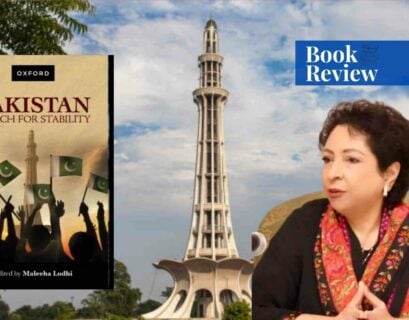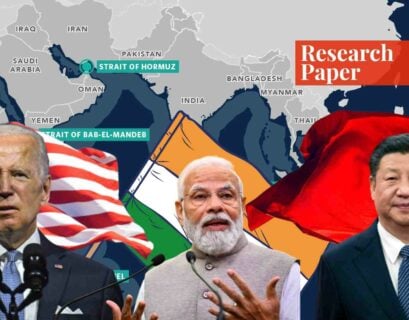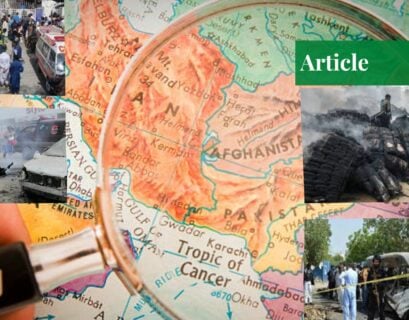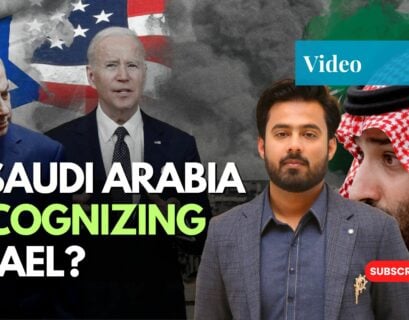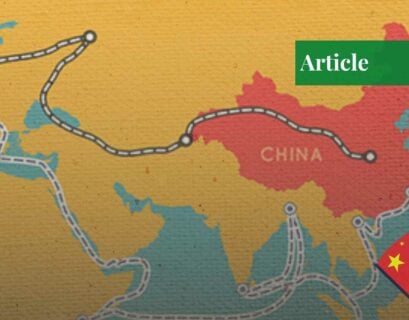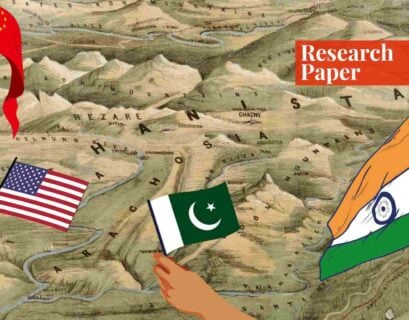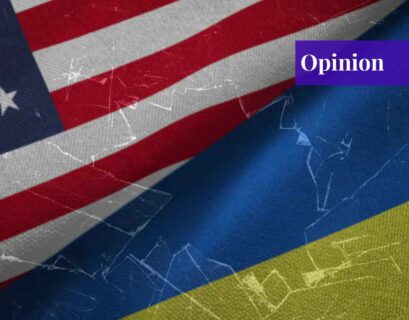Analyzing the Iranian and Israeli Counter-Strikes
April has been eventful for security analysts and geopolitical experts.
The long and bitter rivalry between Iran and Israel was fully exhibited by the repeated strikes and counter-strikes between the two.
There is something oddly interesting about these retaliatory attacks, and Abdullah Nisar shares his take on the attacks between 1st and 19th April and how things will play out.
Will Iran make its move against Israel for the Isfahan attacks?
Europe: The Architect of the Palestinian Conflict?
With the ongoing war in Gaza, Palestine has been dubbed an “open-air graveyard” by the EU’s Josep Borrell. Bilal Hyder Simair condemns Europe’s superficial concern for Palestinians and their land when it has been complicit in sowing the seeds of the Palestinian conflict in the first place. He notes that the European states and the US have actively supported Israel and its heinous war crimes in Palestine for decades and have, therefore, actively failed humanity, not just the people of Palestine.
The Iran-Israel War: A False Front of Power
The Iran-Israel war has been making headlines in April, and rightly so—the fear of a WWIII happening has the world glued to screens now, more than ever before.
Lt Gen (R) Tariq Khan has a different view of these attacks between Iran and Israel. He deems them only to be an act; a play that appears to show both countries as protagonists.
The Iran-Pakistan Gas Pipeline Project: Diplomacy and Pakistan’s Options
Pakistan is facing challenges in navigating its relationship with the United States and its neighbors, particularly concerning its energy project with Iran.
Tufail Abbas argues that the United States’ diplomatic brinkmanship vis-à-vis the Iran-Pakistan gas pipeline is an attempt to deprive Iran of breathing space and inflict damage on its economy. United States’ global image and standing have been on the decline due to its domestic irregularities, financial hardships, and eroding external influence.
He argues that Pakistan should adopt a non-adventurist external posture, engage with all major powers, and rally support for a more democratized, pluralistic, and multilateral global order.
Pakistan: Search for Stability by Dr. Maleeha Lodhi
Pareesa Memon outlines the accomplishments and publications of Dr. Maleeha Lodhi, a prominent figure in Pakistan’s diplomatic landscape. Her review of Dr. Lodhi’s book “Pakistan: Search for Stability,” focuses on Pakistan’s political, economic, and social challenges.
The book highlights the issues such as the disengaged youth, current account deficit, climate change, and more. It concludes with recommendations and solutions for said issues, including governance reforms, economic revival, youth engagement, and the strengthening of local governments.
Major Powers’ Interests in IOR And Implications For the Region
The Indian Ocean Region (IOR) is a critical area of focus for global powers due to its economic significance, strategic chokepoints, and natural resources.
The US, China, and India are vying for dominance in the region, with new alliances and military bases being established to safeguard their interests. China and India are expected to be major engines of growth.
The complex interdependence and potential threats in the IOR necessitate constructive dialogue and a balanced approach to regional security.
Terror Attacks in Pakistan: Role of Afghanistan in Promoting Instability
Since the American withdrawal from Afghanistan in 2021, Pakistan has consistently voiced its concern regarding the neighboring country’s harboring of terrorists. The recent surge in terror attacks in Pakistan, Iran, and Russia has reignited this concern, prompting questions about American interests in fostering instability in the region.
[Video] Is Saudi Arabia Recognizing Israel?
This video examines a potential historic shift in the Middle East—Saudi Arabia’s potential recognition of Israel. Driven by American efforts for regional stability, the normalization of Saudi-Israel relations will have both benefits and consequences for the region, particularly for Palestine.
Russia’s War in Ukraine: Shrouded in Western Hypocrisy
In his analysis, Lt Gen (R) Tariq Khan discusses the glaring hypocrisy of the West amid Russia’s war with Ukraine. He highlights the stark contrast in Western response, noting that despite its apathy towards conflicts in Iraq, Palestine, and Bosnia, the West has now decided to raise its voice for Ukraine simply because it’s considered “civilized,” unlike the others. The author critiques Western involvement and its portrayal of Ukraine as a victim, while predicting a grim future for the country. He emphasizes the need for a fairer global order based on equality and justice.
Is China’s Belt and Road Initiative (BRI) Another Marshall Plan?
Though they’re separated by more than half a century, the American Marshall Plan and China’s Belt and Road Initiative (BRI) were both responses to global crises. Fahad Nasir provides a comparative analysis of the two financial initiatives, drawing upon the differences and similarities between the two in a comprehensive manner.
Palestine: Nemesis of Islamic Character
The conflict between Israel and Palestine is complex and has historical, military, and political dimensions. It is rooted in the illegal occupation of Palestinian land. The crisis has been analyzed extensively, but the suffering continues.
Lt Gen (R) Tariq Khan states that it is crucial to take a stand, especially when innocent lives are at stake. The conflict is not about generalizations but specific incidents of legal, moral, communal, and societal violations.
The historical backdrop of the conflict goes back over a century, with the concept of Zionism playing a significant role.
The New Great Game: A Pakistani Perspective
Lt Gen Tariq Khan provides an in-depth account of the historical rivalry known as the “Great Game” that took place between the British and Russian empires in the subcontinent during the 19th century.
In his paper, he explains that the withdrawal of the US from Afghanistan created a power vacuum, which set the stage for a “New Great Game” in the South Asian region.
This region is of immense importance due to its geo-strategic location which is central to China, Central Asian republics, Iran, and Pakistan.
Kidnapping of the Century: The Case of Charles Lindbergh Jr.
In 1932, America witnessed the kidnapping of Charles Lindbergh Jr., the infant son of pioneer aviator Charles Lindbergh and Anne Morrow. With only a ransom note and a broken ladder left behind, the kidnapper disappeared into the night. Labeled “The Kidnapping of the Century,” the crime garnered both international and domestic attention, propelling the US Congress to pass the Federal Kidnapping Act.
Israel’s Heinous Targeted Killing Programme
The ongoing Israeli war in Gaza has brought to the fore the violations of international law committed by Israel. Sarmad Ishfaq discusses one such violation—Israel’s targeted killing program—and the moral and legal debates surrounding it. Highlighting the historical context and prominent operations, he outlines Israel’s use of targeted killings to eliminate perceived threats, including Palestinian leaders and Iranian nuclear scientists.
Countries with the Highest GDP per Capita for Each Continent
Across continents, countries exhibit diverse economic standings. This infographic highlights the top-ranking countries in terms of GDP per capita on each continent.
Trump’s Ukraine Policy: From Allies to Ambiguity
As US elections loom, people have started to pay closer attention to candidates and their policies regarding pressing global issues.
Sanan Lashari gives his candid opinion as he explains Donald Trump’s stance regarding the war in Ukraine.
Although Trump has publicly wished for the war to end, his sentiments are troubling for the Western world as he stated he would endorse a Russian invasion of Ukraine if the latter did not pay its share of the NATO defense budget.
Artificial Intelligence and National Security: A Way Forward for Pakistan
Noman Ali Kalhoro identifies the loopholes and shortcomings in the draft national AI policy by the Ministry of Information Technology and Telecommunication, a document that has the potential to shape Pakistan’s roadmap towards a competitive posture in this technological era.
By examining the US’s National Artificial Intelligence Initiative and China’s New Generation Artificial Intelligence Development Plan, he showcases their guiding principles, ideology, and implementation methods while investigating the influence of AI in the national security paradigm.




